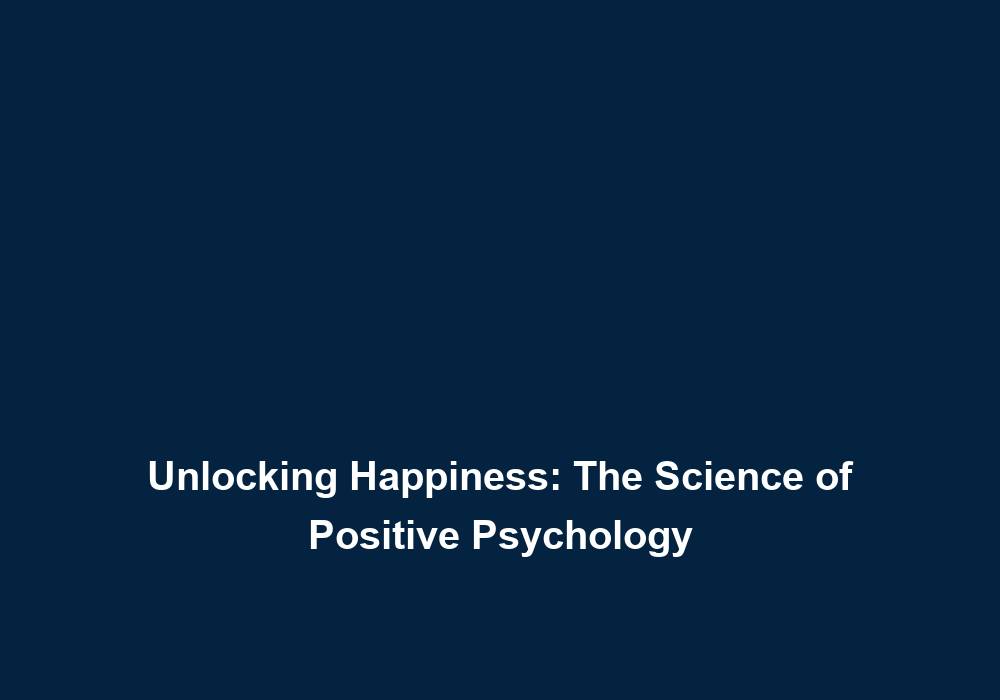Unlocking Happiness: The Science of Positive Psychology
In the pursuit of a fulfilling and joyful life, positive psychology emerges as a valuable field of study. It provides us with insights and tools to enhance our well-being, unlock our happiness, and live a more meaningful existence. This article dives into the fascinating realm of positive psychology, exploring its core principles, techniques, and benefits.
What is Positive Psychology?
Positive psychology is the scientific study of what enables individuals and communities to thrive and lead fulfilling lives. While traditional psychology primarily focuses on addressing mental health issues and disorders, positive psychology takes a proactive approach by examining the factors that promote well-being and happiness.
Positive psychology aims to understand and amplify the positive aspects of human experience, such as strengths, virtues, positive emotions, and meaningful relationships. By shifting the focus from pathology to well-being, positive psychology offers a comprehensive framework for individuals to flourish and live their best lives.
The Core Principles of Positive Psychology
1. Focus on Strengths and Virtues
Positive psychology emphasizes identifying and nurturing personal strengths and virtues rather than solely focusing on weaknesses and deficits. By leveraging our unique qualities, we can enhance our well-being and build a life that aligns with our passions and values.
To focus on strengths and virtues, it is essential to identify and understand our own individual strengths. This can be done through self-reflection, assessments, or seeking feedback from others. Once we have a clear understanding of our strengths, we can intentionally cultivate and apply them in various aspects of our lives. By aligning our actions with our strengths, we not only experience a greater sense of competence and accomplishment but also find more enjoyment and fulfillment in what we do.
2. Cultivate Positive Emotions
Positive emotions play a crucial role in our overall happiness and well-being. Positive psychology encourages individuals to embrace positive emotions such as joy, gratitude, hope, and love. By intentionally cultivating these emotions, we can experience increased life satisfaction, resilience, and overall psychological well-being.
One way to cultivate positive emotions is through engaging in activities that bring us joy and happiness. This could include pursuing hobbies, spending time with loved ones, or engaging in acts of kindness. Additionally, practicing gratitude on a regular basis can help shift our focus towards the positive aspects of life. By acknowledging and appreciating the good things, we can enhance our overall well-being and foster a positive mindset.
3. Foster Positive Relationships
Human connections are fundamental to our well-being. Positive psychology emphasizes building and nurturing positive relationships with others. Meaningful connections with friends, family, and communities contribute to our happiness and provide a support system during challenging times.
To foster positive relationships, it is important to invest time and effort in building connections with others. This can involve active listening, empathy, and effective communication skills. Engaging in activities that promote social interaction, such as joining clubs or participating in community events, can also help in developing meaningful relationships. By prioritizing and nurturing these connections, we not only enhance our own well-being but also contribute to the well-being of others.
4. Pursue Meaning and Purpose
Living a life of purpose and meaning brings a deep sense of fulfillment. Positive psychology encourages individuals to identify and pursue their passions, values, and goals. By aligning our actions with our core values, we can experience a greater sense of purpose and happiness.
To pursue meaning and purpose, it is important to reflect on our values and beliefs. What truly matters to us? What gives our lives a sense of meaning? Once we have a clear understanding of our values, we can set meaningful goals and take steps towards achieving them. By living in alignment with our values and pursuing activities that bring us joy and fulfillment, we can experience a greater sense of purpose and satisfaction in life.
5. Practice Mindfulness and Gratitude
Mindfulness and gratitude are powerful tools in positive psychology. Mindfulness involves being fully present in the moment, while gratitude involves acknowledging and appreciating the positive aspects of life. Incorporating these practices into our daily lives can enhance our overall well-being and foster a positive mindset.
To practice mindfulness, we can engage in activities such as meditation, deep breathing exercises, or simply paying attention to our senses in the present moment. By cultivating a state of mindfulness, we can reduce stress, improve concentration, and enhance our emotional well-being.
Gratitude can be practiced through keeping a gratitude journal, where we regularly write down things we are grateful for. This practice helps shift our focus towards the positive aspects of our lives, cultivating a sense of appreciation and contentment. By reflecting on the good things, we enhance our overall well-being and increase happiness.
Techniques and Practices in Positive Psychology
1. Positive Affirmations
Positive affirmations involve repeating positive statements about oneself or specific goals. These affirmations can help reframe negative self-talk and foster a positive mindset. By affirming our strengths and capabilities, we boost self-confidence and promote a sense of empowerment.
To incorporate positive affirmations into our daily lives, we can create a list of affirmations that resonate with us personally. These affirmations can be repeated in the morning or whenever we need a confidence boost. By consistently practicing positive affirmations, we can rewire our thought patterns and cultivate a more positive and self-assured mindset.
2. Gratitude Journaling
Keeping a gratitude journal involves regularly writing down things we are grateful for. This practice helps shift our focus towards the positive aspects of our lives, cultivating a sense of appreciation and contentment. By reflecting on the good things, we enhance our overall well-being and increase happiness.
To start a gratitude journal, set aside a few minutes each day to write down three to five things you are grateful for. These can be simple things like a beautiful sunset, a supportive friend, or a delicious meal. By consistently practicing gratitude journaling, we train our minds to notice and appreciate the positive aspects of life, leading to increased happiness and well-being.
3. Random Acts of Kindness
Engaging in acts of kindness towards others can have a profound impact on our happiness and well-being. Simple acts such as helping a stranger, volunteering, or expressing gratitude can create a ripple effect of positivity. These acts not only benefit others but also foster a sense of purpose and connection within ourselves.
To incorporate random acts of kindness into our lives, we can start by looking for opportunities to help others on a daily basis. This could include holding the door open for someone, offering a listening ear, or performing small acts of kindness anonymously. By practicing kindness towards others, we not only contribute to their well-being but also experience a sense of fulfillment and joy.
4. Mindfulness Meditation
Mindfulness meditation involves focusing our attention on the present moment without judgment. Regular practice of mindfulness meditation can reduce stress, improve concentration, and enhance overall emotional well-being. By cultivating a state of mindfulness, we can experience increased happiness and a greater sense of inner peace.
To practice mindfulness meditation, find a quiet and comfortable space where you can sit or lie down. Close your eyes and bring your attention to your breath. Notice the sensations of each inhale and exhale, without trying to change anything. If your mind wanders, gently bring your focus back to the breath. Start with a few minutes of practice and gradually increase the duration over time. By making mindfulness meditation a regular part of your routine, you can experience the numerous benefits it offers, including increased happiness and well-being.
5. Strengths-Based Approach
Identifying and utilizing our strengths is a fundamental practice in positive psychology. By understanding our unique strengths, we can effectively leverage them in various aspects of our lives. This approach empowers us to tackle challenges, achieve goals, and experience a greater sense of satisfaction and fulfillment.
To identify your strengths, reflect on activities or tasks where you feel confident, energized, and engaged. What comes naturally to you? What activities bring you a sense of accomplishment? Once you have identified your strengths, find opportunities to apply them in your personal and professional life. By leveraging your strengths, you can maximize your potential, overcome obstacles, and experience a greater sense of fulfillment.
The Benefits of Positive Psychology
Embracing the principles and practices of positive psychology can lead to numerous benefits in our lives:
-
Increased happiness and life satisfaction: By focusing on well-being and cultivating positive emotions, positive psychology enhances overall happiness and life satisfaction.
-
Improved mental and physical well-being: Positive psychology promotes mental and physical health by nurturing positive relationships, practicing mindfulness, and leveraging strengths.
-
Enhanced resilience and coping skills: Positive psychology equips individuals with the tools and techniques to navigate challenges and build resilience.
-
Strengthened relationships and social connections: By fostering positive relationships and practicing acts of kindness, positive psychology enhances social connections and deepens meaningful relationships.
-
Greater self-awareness and personal growth: Positive psychology encourages self-reflection and self-discovery, leading to increased self-awareness and personal growth.
-
Heightened motivation and productivity: By aligning actions with values and pursuing meaningful goals, positive psychology boosts motivation and productivity.
-
Reduced stress and anxiety levels: Through mindfulness practices and cultivating gratitude, positive psychology helps reduce stress and anxiety levels.
By incorporating positive psychology into our daily lives, we can unlock our true potential, cultivate happiness, and live a more fulfilled existence.
This article is written by a SEO content writing expert, fluent in English, specializing in positive psychology and well-being.







